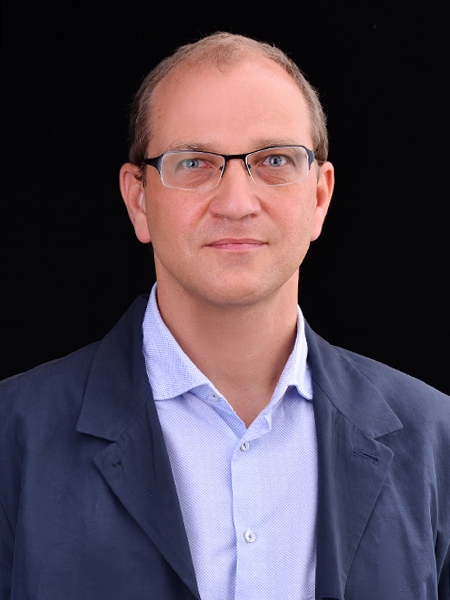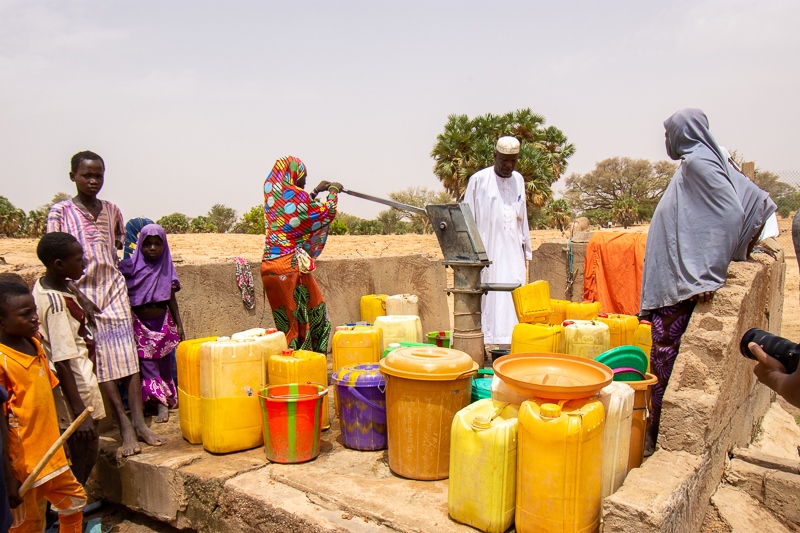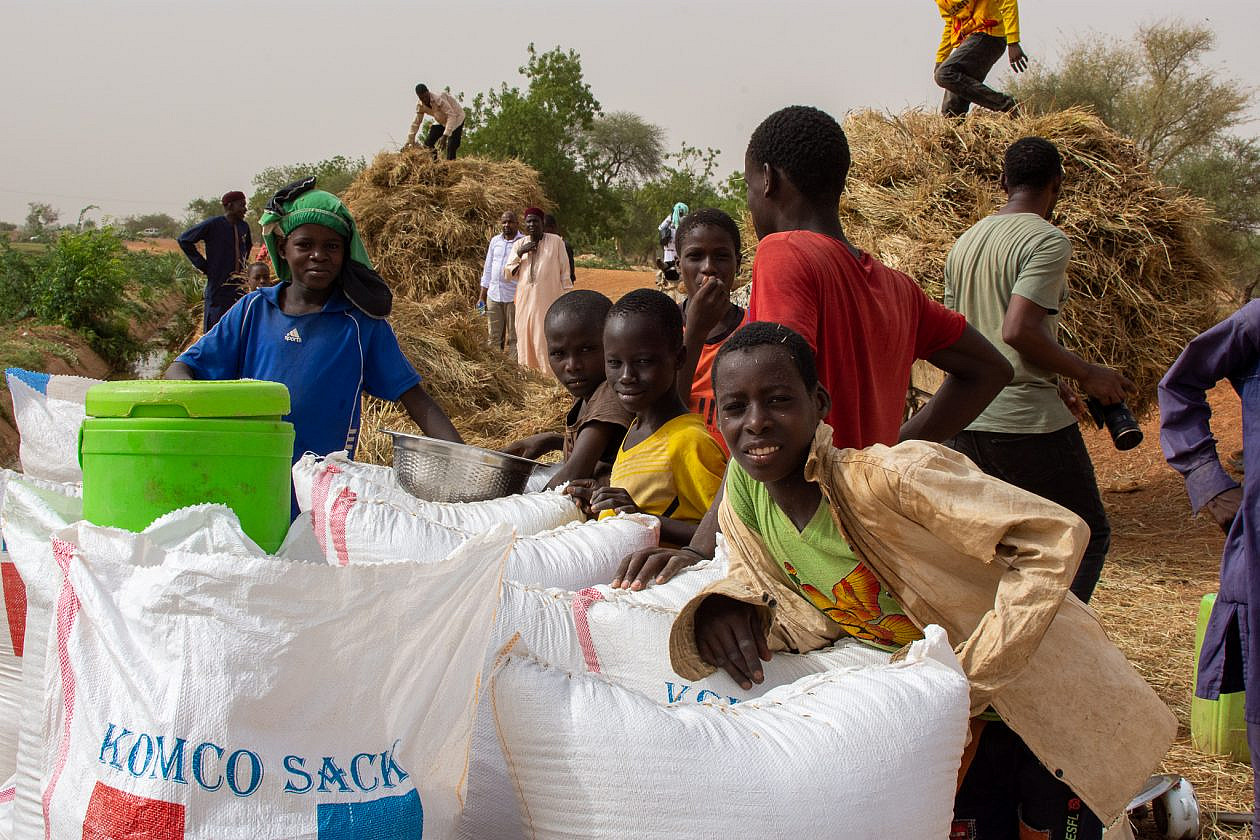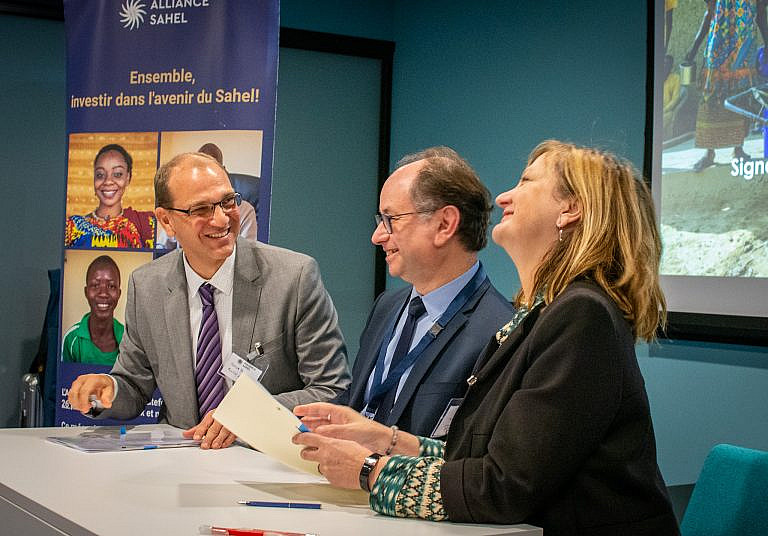Building the resilience of municipalities in the Sahel: the Sahel Facility’s first assessment
Launched at the end of October 2021, the “Sahel Facility” programme supports the most vulnerable populations in the Tri-border region. In addition to the German government’s initial funding of €50 million, France will also contribute to this financial instrument, with a financial envelope of €5 million. One year after the launch of the Facility, Patrick Berg, Executive Director of the Sahel Facility Foundation, shares in this interview the first achievements and challenges encountered.
In a few words, in what context was the Sahel Facility created and what were its objectives?

The idea of creating the Facility was developed by the members of the Sahel Alliance during a meeting of their steering committee. The idea was to initiate a more agile and flexible funding instrument to complement bilateral cooperation efforts. Legally, the two structures are independent. But the Facility feels part of the Sahel Alliance family, with whom we are in permanent contact, in particular to adjust priorities and multi-sector territorial choice. The Facility follows the Integrated Territorial Approach: we focus on the priority regions already identified by the Sahel Alliance and we discuss the choice of these regions with local partners, including Sahell Alliance members, to complement their interventions.
The Sahel Facility is a civil society actor acting outside bilateral cooperation, even if the funds come from Sahel Alliance member states and institutions. The Facility also aims to assist the efforts of the G5 Sahel in the socio-economic sector. The Facility was created in the belief that it is necessary to strengthen the resilience of communities in the face of the dangers posed by terrorist movements in order to achieve real stability and lasting peace. This strengthening of municipalities reflects the Facility’s mandate to work directly with local, regional and community stakeholders and with the broader initiatives of the G5 Sahel and the Sahel Alliance.

What are the Facility’s main achievements?
The Facility exists since September 2021, we are still a very young institution! Last year we worked a lot on the implementation of the legal and logistical frameworks of our work. In parallel, we have already signed two funding contracts with NGO consortia, one in Mali and the other in Mauritania. We have launched two more call for projects in Burkina Faso and Chad and we are already working on launching new call for projects for next year. After barely a year of operation, we are satisfied with the results. What was really surprising for all our partners is that it only takes 6 months from the launch of a call for proposals to the signing of the funding contract.
In Mali, work has already begun in the Gao region. These are works that complement activities already underway in the region. For example, we have built latrines for health centres, for markets, we have created water points, vaccination parks and markets to develop the economy… Unfortunately the current situation in our area of intervention in Mali is very difficult on several levels. Security is a serious challenge, and since very recently the Malian government has banned French-funded NGOs. We are waiting for clarification on the implementation of the Malian government’s decisions. Regarding the implementation of projects in Mauritania, all contracts have been signed and we are now in the phase of inclusive dialogue with all stakeholders to identify activities in the beneficiary regions.
What are the Facility’s current priorities?
The first priority is to continue with the launch of new calls for proposals. We will present two new calls in early 2023 in Niger and Mauritania. We are very proud that with the Niger call, we will have projects supported for the populations of the 5 countries of the Sahel region. Two other calls for proposals will also be launched in the second half of 2023. We will invite more donors in 2023 to support our work.
In addition, next year we want to explore the possibilities of cross-border projects with our partners. The advantage of the Facility is that it can finance such projects. This is an advantage over bilateral projects which usually only involve one country.
In this type of analysis, the Facility benefits from strong regional voices within its institutions, which translates into a high level of ownership of our projects by those concerned. For example, we have the participation of the Executive Secretary in our strategic board. In our advisory board, we have the participation of members from the 5 countries (local governments, civil society, regional and cross-border associations) who we see regularly and who relay the expectations of the population. It is an important network of resource persons.

What are the challenges you face on the ground, particularly in meeting the people’s needs and aspirations?
The biggest challenge is the unstable security situation, for example in the Gao region of Mali where some areas are no longer accessible by local companies and NGOs. Getting to some villages and working there has become too dangerous. Our projects commit us for the long term, 5 to 6 years, but it is difficult when we launch the call for projects to know what the security situation will be two or three years later… To meet this challenge, the advantage of the Facility is that it is extremely flexible, which helps us to find creative solutions to continue the work if the initial plan no longer works. For example, we are faced with displacement of people who flee their villages to IDP camps. In this case, we try to redirect our planned activities in the affected villages to the people’s new homes, in order to stay with the beneficiaries identified at the beginning of the project. We then try to create activities where the displaced people are. For example, the installation of a water network that will contribute to the long-term development of the city, even after the current emergency situation. We are also looking for communes that share similar problems and have similar local development plans that can be used to implement the activities.
We also face another challenge: the initial idea of the Facility is to work in peripheral areas, far from the cities. However, local authorities are not always present in their villages, for example because of insecurity. Furthermore, small municipalities do not necessarily have sufficient technical staff to follow up the implementation of projects. This can be a problem for our local cooperation. Therefore, in some cases we work with NGOs for the implementation of activities, provided that they work closely with the local population and authorities.
Which accomplishments do you take pride in? What is the key to these successes?
We are very satisfied with our application procedure. The approach is low-key at the outset, with only a two-page concept note being sent. This has encouraged the participation of local NGOs in the process. We then select a small number of convincing applicants for the final selection phase, and invite them to submit the usual documents: project description, work plan. We have had a lot of positive feedback on this approach, including from the small NGOs that have responded to the calls – even from those that have not been successful.
In terms of the keys to our success, the facility has two strengths: on the one hand, a small and very committed team with diverse experience in Africa. We are only 5 employees and we work together directly, without having to involve other departments before making a decision. This allows us to act very quickly both in project selection and when we need to provide a response to an emergency. Secondly, our excellent regional network.
The advisory board, the close collaboration with the G5 Sahel and local authorities, the work with the Sahel Alliance partners on the ground, all help us to identify needs and develop approaches adapted to the local situation.
Signature of the financing agreement of the Sahel Facility by France:

France makes a financial contribution to the Sahel Facility
During the operational steering committee of the Sahel Alliance on 7 December 2022, representatives of the Agence Française de Développement and the Sahel Facility signed a financing agreement for an amount of 5 million euros. France has decided to join Germany as a donor to the Sahel Facility. Germany has committed €50 million to the Sahel Facility. The Sahel Facility is part of a desire to pool the approaches and solutions of donors attentive to the particularly difficult situation of the G5 Sahel countries, whose populations’ security seems to be deteriorating further, so that their social cohesion is often threatened. The Sahel Facility aims to respond to this by financing relevant programmes to improve infrastructure and create income opportunities for local communities in economically promising sectors such as agriculture, livestock breeding and handicrafts. The aim is therefore to promote a framework that is conducive to better living conditions for the populations, to effectively combat the disintegration of social ties and, consequently, to better preserve peace among them. This approach fits well with that of the Minka Initiative in the Sahel, which aims to contribute to the consolidation of peace, conflict prevention and development in the targeted areas of the G5 Sahel countries.
Go further

